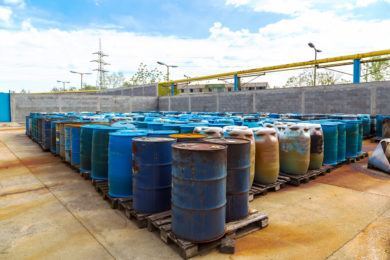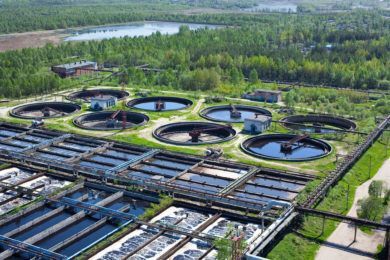Industrial waste management is the process by which industrial manufacturing businesses dispose of the waste products generated by their operations. It is important to implement an efficient industrial waste management system to ensure your company is responsible and environmentally friendly when generating a significant amount of waste. Industrial waste may be more harmful to the environment than standard municipal waste.
Let’s tackle the answers to some frequently asked questions about industrial waste management and disposal.
What Is Industrial Waste?
Industrial waste is any non-hazardous waste (i.e., waste that is not regulated under the Resource Conservation and Recovery Act (RCRA), Subtitle C) generated via industrial processes. This can include wastewater, construction and demolition materials, and scraps generated during manufacturing, as well as shipping containers, such as drums.
What Is Hazardous Industrial Waste?
Hazardous industrial waste regulated under RCRA Subtitle C is defined as waste that is not regulated under RCRA Subtitle D (for non-hazardous solid waste). Hazardous wastes include sewage, radioactive waste, shredded circuit boards, and spent sulfuric acid, among many others.
Are There State/County/City Regulations?
The Resource Conservation and Recovery Act (RCRA) is the series of laws and regulations determined by the EPA to enforce waste management requirements; Subtitle C consists of hazardous waste regulations and Subtitle D consists of non-hazardous (solid) waste regulations. However, the EPA has only set minimum federal requirements in Subtitle D, and so states are encouraged to develop their own, stricter regulations related to non-hazardous industrial waste management (available at the state regulatory agencies).
What Industries Require Industrial Waste Management?
Any industrial or manufacturing process that generates a large amount of industrial waste in its operations, but does not have a way to fully manage waste removal in-house, requires industrial waste management services.
Why Does Industrial Waste Management Matter?
Industrial waste removal is very important to consider when developing processes. If industrial waste is not handled properly, it can negatively affect both the environment and human health. In addition, effective industrial waste management can reduce regulatory fees and operational costs.
How Can Companies Reduce Their Need for Industrial Waste Management?
Companies can reduce their need for industrial waste management by improving their processes to reduce the amount of waste produced. This may include updating equipment or processes. In some processes, it may be possible to recycle waste materials and turn waste to energy to reduce the amount of waste generated and improve sustainability. Additionally, recycling could reduce the amount spent on raw materials. These steps push companies closer to “Zero Waste”.
What Is “Zero Waste?”
Zero waste is a manufacturing philosophy that aims to reflect natural use/replenish cycles by reusing all materials over the life cycle of a product rather than sending waste to landfills. In general, zero waste is more of a goal to continuously strive for than a task to accomplish; however, starting a zero waste initiative can not only improve the sustainability of a process, but reduce costs related to raw materials, regulatory fees, and waste management.
Who Should Companies Contact if They Have Concerns About Industrial Waste Management?
If you have questions regarding specific industrial waste management regulations and compliance, they can contact their local state regulatory agency. Additionally, if you have questions regarding industrial waste disposal or pick up, you can contact your local industrial waste management facility.
If you’d like to learn more about industrial waste disposal practices, or you’re ready to update your disposal equipment and processes, contact us today!








